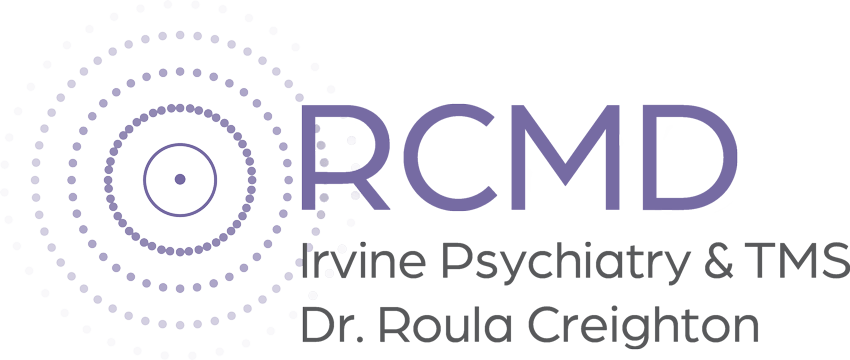• In Business Since 2008
4199 Campus Drive,
Suite #550 Irvine CA, 92612
Psychotics Disorder
IRVINE PSYCHIATRY AND TMS - DR. ROULA CREIGHTON
What is Psychotic Disorder?
Psychotic disorder is a mental illness that affects a person's ability to think, feel, and behave clearly. It is characterized by symptoms such as hallucinations, delusions, and disordered thinking. The most common types of psychotic disorders are schizophrenia, schizoaffective disorder, and bipolar disorder with psychosis.
Signs of Psychotic Disorder
Hallucinations
Delusions
Disordered
Modern caring mental health and behavioral
We understand that treating a psychotic disorder can be complex and challenging. However, with the right treatment and support, individuals with a psychotic disorder can recover and lead fulfilling lives. The most common treatments for a psychotic disorder include:
We understand that understanding the signs of psychotic disorder is essential for early detection and treatment. Some of the key signs of a psychotic disorder include:
- Hallucinations: One of the key signs of a psychotic disorder is experiencing hallucinations. These can include hearing voices, seeing things that are not there, or experiencing other sensory perceptions that are not real.
- Delusions: Another common symptom of a psychotic disorder is having fixed, false beliefs that are not based in reality. These delusions can take many forms, such as believing that someone is trying to harm you or that you have special powers or abilities.
- Disordered Thinking: Individuals with a psychotic disorder may also experience symptoms such as disordered speech, disordered movement, or changes in emotional expression. These symptoms can make it difficult for individuals to function in daily life and can lead to social isolation, problems at work or school, and difficulties in relationships.
It's important to note that not everyone who experiences these symptoms has a psychotic disorder, and that early detection and treatment can make a significant difference in an individual's recovery and overall well-being. If you or someone you know is experiencing symptoms of a psychotic disorder, please contact Irvine Psychiatry and TMS or seek local professional help.
Medication: Antipsychotic medication can help to reduce symptoms of hallucinations, delusions, and disordered thinking.
Therapy: Therapy such as cognitive-behavioral therapy and family therapy can help change negative thought patterns and behaviors that contribute to symptoms.
Supportive Therapy: Supportive therapy can help individuals with daily living skills, managing symptoms, and managing the emotional and social impact of the illness.
Psychosocial interventions: Rehabilitation and vocational training can help individuals achieve their goals, improve their ability to function in daily life, and reduce symptoms of anxiety and depression.
Work Therapy Benefits
A psychotic disorder can be a challenging and complex condition, but with the right treatment and support, individuals can recover and lead fulfilling lives. Medication, therapy, supportive therapy, and psychosocial interventions are all effective treatment options that can help individuals manage symptoms and improve their overall well-being.
If you or someone you know is experiencing symptoms of a psychotic disorder, it's important to seek professional help. Contact us for more information on how we can help or look for local professionals that can provide the support and guidance you need on your journey towards recovery. Remember, early detection and treatment can make a significant difference in an individual's recovery and overall well-being.
Explore Services
Send us a Message
Website Form
We will get back to you as soon as possible.
Please try again later.
Need help?
Contact Us Today
We’d love to hear from you. Choose the most convenient method and we’ll get back to you as soon as we can within 24 hours.
CALL US TODAY:
Contact Information
PATIENT TESTIMONIALS
Read What Our Patients Are Saying About Us
William
RCMD Patient
'Anyone dealing with, or suffering from, Panic disorder will find psychological and medical expertise specific to this disorder, and would ultimately achieve improved quality of life under the care and supervision of Dr. Roula Creighton.'

Lisa
RCMD Patient
'Someone in need of psychiatric care will be very well taken care of pharmaceutically and therapy-wise with Dr. Roula Creighton. Excellent physician. She listens carefully, is involved in caring for her patients, and very professional.'

Maria
RCMD Patient
'Telehealth was extremely seamless and more comfortable than I anticipated; this platform is just fine given the situation with this pandemic and Dr. Creighton was just as caring as usual...I have no issues with the manner by which the care is delivered.'

Patient Focused Care
Please Call or email to schedule your appointment.
CALL US TODAY:
Get latest updates Subscribe to Our Newsletter
Newsletter Subscription
We will get back to you as soon as possible.
Please try again later.
About Us
Irvine Psychiatry and TMS is Orange County's leading provider of cutting-edge & expert psychiatric care. We offer a variety of treatment options to meet each individual's needs.
Useful Links
Services
Irvine Psychiatry and TMS Dr. Roula Creighton
Phone: (949) 202-7566
Fax: (949) 437-3428
Email: admin@irvinepsychiatry.com
Location: 4199 Campus Drive, Suite #550 Irvine, California 92612
Irvine Psychiatry and TMS | Powered by Vulcan


